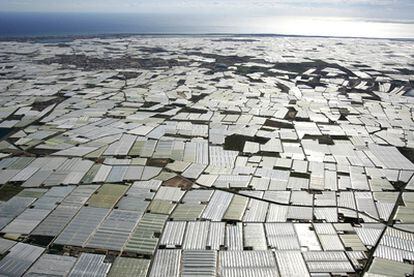The damage done by Germany
Almería's agriculture sector is reeling from the effects of the E. coli outbreak
The cucumber crisis in the Andalusian province of Almería has proven that agriculture can be a profitable business in a globalized world, but also that national borders can be shut down much more swiftly than they are opened up — and that farmers continue to be the weakest link in the supply chain. Almería's crops represent 25 percent of the value of Andalusia's entire production, so it could well be said that if Almería sneezes, Andalusia catches a cold. But the waves from this crisis are reaching even further: the Spanish regions of Murcia and Valencia, and even Portugal, are feeling the effects of low crop sales. And the entire European Union could suffer from import bans imposed by countries such as Russia.
Germany has timidly lamented the damage it did to Spanish greenhouses
Last week's vegetable auctions in El Ejido yielded rock-bottom prices
Producers here knew the outbreak did not originate in their greenhouses
All it took was one wrong step by German authorities, who, despite lacking sufficient evidence, said that Almería cucumbers were to blame for the first deaths from the bacteria Escherichia coli in the north of that country. So far, 22 people have died and more than 2,000 have fallen ill. Germany has timidly lamented the damage it did to Spanish greenhouses: the cucumbers are not guilty, they say. But it's not just cucumbers that are paying the price; it's also tomatoes, eggplants, zucchinis, melons... The harvest in Almería is pretty much over, and it is just as well that the season was coming to an end. "If this had happened a month ago, it would have been fatal," says one farmer.
The British writer and hispanist Gerald Brenan, who lived in Granada in the 1930s, visited Almería and wrote that "it could have well been the Sinai desert." It would take Don Geraldo's inspired pen to provide an apt description of the plastic landscape that covers that desert nowadays. Over 20,000 hectares of plastic hot-houses conceal a land that was once barren, conforming a unique and even fascinating landscape. In the mid-1950s, underground aquifers were discovered on land that barely gets 25 days of rainfall a year. The hothouses did the rest. El Ejido, the capital of this plastic world, had 50,000 inhabitants in the early 1990s and 85,400 today.
Almería exports 1.6 million tons of fruit and vegetables, or around 60 percent of its production, mainly to Germany, France and Britain. Income in this part of the world is unlike that of any regular crop grower: in the 1990s, when Almería's intensive farming took off, one hectare of land brought in average profits of 10 to 15 million pesetas (60,000 to 90,000 euros), according to a report by the Cajamar Foundation, which releases comprehensive annual studies on Spanish agriculture. Revenues are 10 percent lower now, but the average income for a producer is still 95 percent of the Spanish average income. By comparison, it was not even 45 percent in the 1950s.
But the 14,000 farmers in the area complain that for a plant to produce 10 kilograms of healthy cucumbers before the sun rises over northern Europe, it takes a lot of technology and thousands of square meters of plastic sheeting. Almost nothing is kept from one year to the next: farmers need to buy new seeds (hybrid vegetables are not recycled), sacks of fertile earth, pesticides, fungicides, watering hoses, water...
At the Agrupaejido food exchange, in El Ejido, last week's vegetable auctions yielded rock-bottom prices. The brokers watched the screen carefully as the opening price continued to drop, until one of them pressed the button: 0.09 or 0.10 euros for a kilo of eggplants or peppers. "At that price, it's not even worth harvesting them," says Juan Cervilla, who owns land in the village of Pechina. "Besides, destroying them is also expensive — we have to pay for it, you can't just toss them into the river. You have to take them to dumps and pay for their destruction."
Producers here knew the outbreak did not originate in their greenhouses. "You don't need to be a rocket scientist. If it had come from here, we'd all be sick, since we eat them too," says one grower.
But the crisis has revealed the lack of checks once the produce is loaded onto trucks on their way to other parts of Europe. Who handles them? The worst-case scenario, and this happens quite often, is that when they reach the stores, the contents of the crates get mixed up, as do the varieties.
To say that agriculture has taken a beating is something of an understatement, when we're talking about such industrialized production. The cucumber crisis has been felt by truck drivers, carton makers, pallet makers, pesticide makers and seedling producers. In fact, the waves will affect other services such as car dealers, restaurants and even the banks.
Francisco Fernández is a 31-year-old truck driver who takes the vegetables from the greenhouses to the Canalex cooperative in El Ejido. He makes between 60,000 and 70,000 euros a year. The economy in the area is still keeping up, but the famous Mercedes that used to be seen in town "are old now," says Juan Manuel Vidaña, another farmer. "Now we're in debt."
Cajamar studies show that in the last 35 years, farm profitability in terms of euros per hectare has remained stable due to increased production, which compensated for the drop in prices. But success seems to be a two-way street. The coordinator of a company called Naturechoice, Paco Sola, gestures toward the plastic landscape and says: "This was built by supermarkets in northern Europe — Almería's boom came from there." And that is also where last week's blow came from.











































